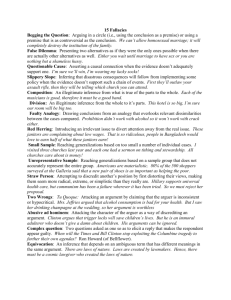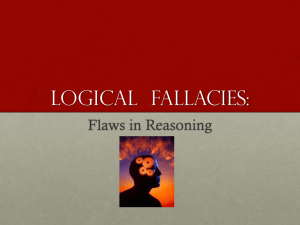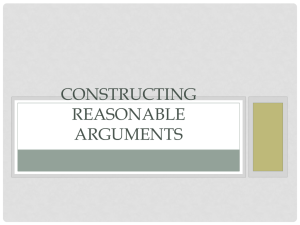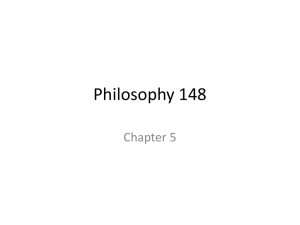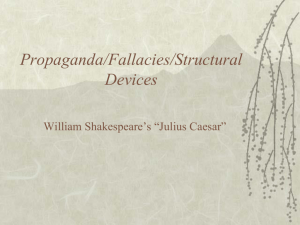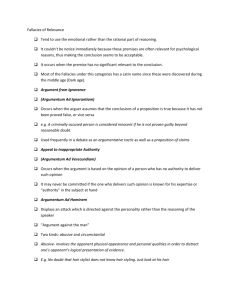Fallacy Review.doc
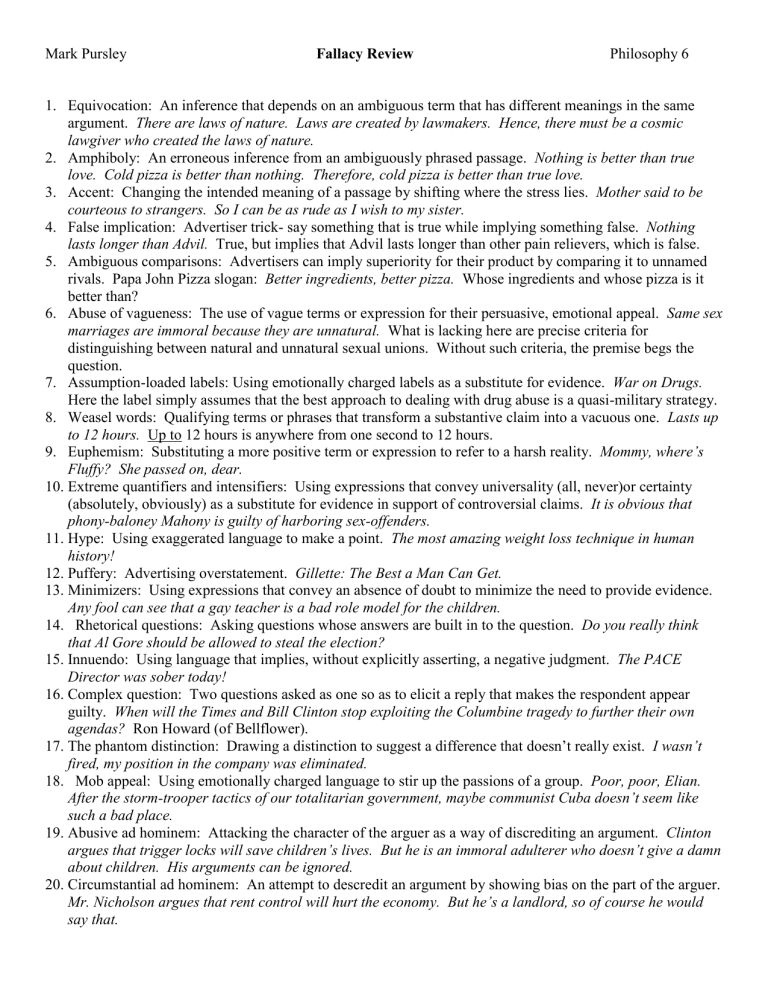
Mark Pursley Fallacy Review Philosophy 6
1.
Equivocation: An inference that depends on an ambiguous term that has different meanings in the same argument. There are laws of nature. Laws are created by lawmakers. Hence, there must be a cosmic lawgiver who created the laws of nature.
2.
Amphiboly: An erroneous inference from an ambiguously phrased passage. Nothing is better than true love. Cold pizza is better than nothing. Therefore, cold pizza is better than true love.
3.
Accent: Changing the intended meaning of a passage by shifting where the stress lies. Mother said to be courteous to strangers. So I can be as rude as I wish to my sister.
4.
False implication: Advertiser trick- say something that is true while implying something false. Nothing lasts longer than Advil. True, but implies that Advil lasts longer than other pain relievers, which is false.
5.
Ambiguous comparisons: Advertisers can imply superiority for their product by comparing it to unnamed rivals. Papa John Pizza slogan: Better ingredients, better pizza. Whose ingredients and whose pizza is it better than?
6.
Abuse of vagueness: The use of vague terms or expression for their persuasive, emotional appeal. Same sex marriages are immoral because they are unnatural.
What is lacking here are precise criteria for distinguishing between natural and unnatural sexual unions. Without such criteria, the premise begs the question.
7.
Assumption-loaded labels: Using emotionally charged labels as a substitute for evidence. War on Drugs.
Here the label simply assumes that the best approach to dealing with drug abuse is a quasi-military strategy.
8.
Weasel words: Qualifying terms or phrases that transform a substantive claim into a vacuous one. Lasts up to 12 hours. Up to 12 hours is anywhere from one second to 12 hours.
9.
Euphemism: Substituting a more positive term or expression to refer to a harsh reality.
Mommy, where’s
Fluffy? She passed on, dear.
10.
Extreme quantifiers and intensifiers: Using expressions that convey universality (all, never)or certainty
(absolutely, obviously) as a substitute for evidence in support of controversial claims. It is obvious that phony-baloney Mahony is guilty of harboring sex-offenders.
11.
Hype: Using exaggerated language to make a point. The most amazing weight loss technique in human history!
12.
Puffery: Advertising overstatement. Gillette: The Best a Man Can Get.
13.
Minimizers: Using expressions that convey an absence of doubt to minimize the need to provide evidence.
Any fool can see that a gay teacher is a bad role model for the children.
14.
Rhetorical questions: Asking questions whose answers are built in to the question. Do you really think that Al Gore should be allowed to steal the election?
15.
Innuendo: Using language that implies, without explicitly asserting, a negative judgment. The PACE
Director was sober today!
16.
Complex question: Two questions asked as one so as to elicit a reply that makes the respondent appear guilty. When will the Times and Bill Clinton stop exploiting the Columbine tragedy to further their own agendas? Ron Howard (of Bellflower).
17.
The phantom distinction: Drawing a distinction to suggest a difference that doesn’t really exist. I wasn’t fired, my position in the company was eliminated.
18.
Mob appeal: Using emotionally charged language to stir up the passions of a group. Poor, poor, Elian.
After the storm-trooper tactics of our totalitarian government, maybe communist Cuba doesn’t seem like such a bad place.
19.
Abusive ad hominem: Attacking the character of the arguer as a way of discrediting an argument. Clinton argues that trigger locks will save children’s lives. But he is an immoral adulterer who doesn’t give a damn about children. His arguments can be ignored.
20.
Circumstantial ad hominem: An attempt to descredit an argument by showing bias on the part of the arguer.
Mr. Nicholson argues that rent control will hurt the economy. But he’s a landlord, so of course he would say that.
21.
Guilt by Association: To cast doubt on an arguer’s position by pointing out her connections with other people or groups.
We can ignore Dershowitz’s argument against capital punishment, after all, he’s a card carrying member of the ACLU.
22.
Genetic Appeal: Rejecting a policy or position because of its origins or source. I forbid the use of drums in this church! Drums were originally used in tribal cultures to contact spirits.
23.
Poisoning the Well: Creating bias against an arguer’s position before he has a chance to articulate his view. Now Jerry Spence will present a paper on legal ethics. Of course, he’s a lawyer so anything he says about ethics is rather dubious.
24.
Invincible Authority: Using an authority to override all evidence to the contrary.
I know that all the world’s leading evolutionary biologists are wrong because Rev. John MacArthur says it is their unwillingness to submit to God that leads them to endorse the theory of evolution.
25.
Irrelevant Expertise: Appealing to an expert to settle an issue that is outside that expert’s area of expertise.
We know that the naturalists are wrong; even the great Albert Einstein believed in the existence of a supernatural creator.
26.
Testimonials: Appealing to the testimony of a celebrity or the personal anecdote of an unknown person as evidence for the value of some product, politician, or cause. Alma Hudson of Xenia Ohio lost 40 pounds in three weeks with new Skinny-Quik diet drink.
27.
Unidentified Experts: Appealing to experts or studies without specifically indicating who the expert is or what the study was. Studies show that college graduates earn a million dollars more in an average life time than non-college graduates.
28.
Biased Experts: Appealing to the testimony of an expert who has a strong bias or conflict of interest.
PG&E president G. Reed says there is nothing to fear from the chromium his plant is leaking in to the groundwater, so it is safe to drink the water.
29.
Division of Expert Opinion: Accepting the opinion of one expert or group of experts when there is not a consensus among all relevant experts. A recent study linked Alzheimer’s to tofu consumption, so we should all quit eating tofu.
30.
Popularity: Attaching evidential value to popular opinion. A vast majority of parents believe an occasional spanking is necessary to discipline children. Therefore, spanking children is morally appropriate.
31.
Positioning: Comparing a product to a better known rival in order to induce users of the better known product to switch. Refreshing Scope mouthwash, no more medicine breath.
32.
Appeal to Tradition: Assuming that old or traditional practices are good. Only males should serve as
Priests; that’s how it has always been in the Catholic Church.
33.
Appeal to Novelty: Arguing that something (or someone) is good because it is new. LAMC PACE, so long same old education.
34.
Provincialism: Using feelings of group loyalty to support a claim. Be American, Buy American.
35.
Appeal to Anger: Treating feelings of anger as though they had evidential value.
Don’t let the radical homosexual activists push their anti-family agenda on the rest of us!
36.
Appeal to Fear or Force: Using threats to persuade another to accept a claim. Hurry in, only 25 at this price.
37.
Appeal to Pity: Attempting to stir up feelings of pity to win support for a claim. Please officer, if I lose my license there will be no one to take Mother to her doctor’s appointments.
38.
Appeal to Humor or Ridicule: Using humor or ridicule to divert attention away from the relevant evidence. God created Adam and Eve, not Adam and Steve!
39.
Two Wrongs: 1. Tu Quoque: Attacking an argument by claiming that the arguer is inconsistent or hypocritical. Mrs. Jeffries argued that alcohol consumption is bad for your health. But I saw her drinking champagne at the wedding, so her argument is worthless. 2. Common Practice: Attempting to justify a morally suspect practice by claiming that others do as bad or worse things . Half the students in Math 115 are cheating, so it’s only fair that I do so as well.
40.
Straw Person: Attempting to discredit another’s position by first distorting their views, making them seem more radical, extreme, or simplistic than they really are. Hillary supports universal health care, but communism has been a failure wherever it has been tried. So we must reject her proposal.
41.
Red Herring: Introducing an irrelevant issue to divert attention away from the real issue. These janitors are complaining about low wages. That is so ridiculous, people in Bangladesh would love to earn half of what these janitors earn!
42.
Small Sample: Reaching generalizations based on too small a number of individual cases. I visited three churches last year and each one had a sermon on tithing and stewardship. All churches care about is money!
43.
Unrepresentative Sample: Reaching generalizations based on a sample group that does not accurately represent the entire group. Americans are materialistic. 80% of the 500 shoppers surveyed at the Galleria said that a new pair of shoes is as important as helping the poor.
44.
Suppressed evidence: Deliberately suppressing evidence that has a tendency to undermine one’s position.
A real estate agent says: “This house was owned by a quiet group of religious people.” [Not mentioning that they were Heaven’s Gate members who committed suicide in the house.]
45.
Composition: An illegitimate inference from what is true of the parts to the whole. Each of the musicians is good, therefore it must be a good band.
46.
Division: An illegitimate inference from the whole to it’s parts. This hotel is so big, I’m sure our room will be big too.
47.
Questionable Analogy: Drawing conclusions from an analogy that overlooks relevant dissimilarities between the cases compared.
Prohibition didn’t work with alcohol so it won’t work with crack either.
48.
Questionable Cause: Asserting a causal connection when the evidence doesn’t adequately support one.
I’m sure we’ll win, I’m wearing my lucky socks!
49.
Slippery Slope: Inferring that disastrous consequences will follow from implementing some policy when the evidence doesn’t support such a chain of events. First they’ll outlaw your assault rifle, then they will be telling which church you can attend.
50.
False Dilemma: Presenting two alternatives as if they were the only ones possible when there are actually other alternatives as well. Either you wait until marriage to have sex or you are nothing but a shameless hussy.
51.
Begging the Question: Arguing in a circle (i.e., using the conclusion as a premise) or using a premise that is as controversial as the conclusion.
We can’t allow homosexual marriage; it will completely destroy the institution of the family.
52.
Invincible Ignorance: Refusing to consider evidence that contradicts a cherished opinion: I don’t need no biology class, I’ve got the Holy Bible to tell me where man done come from.
53.
Arguing from Ignorance: Treating the fact that a theory has not been proven true as evidence for its falsity, or the fact that a theory has not been proven false as evidence for its truth. I know my guardian angel is watching out for me, no one can prove that he isn’t!
++
